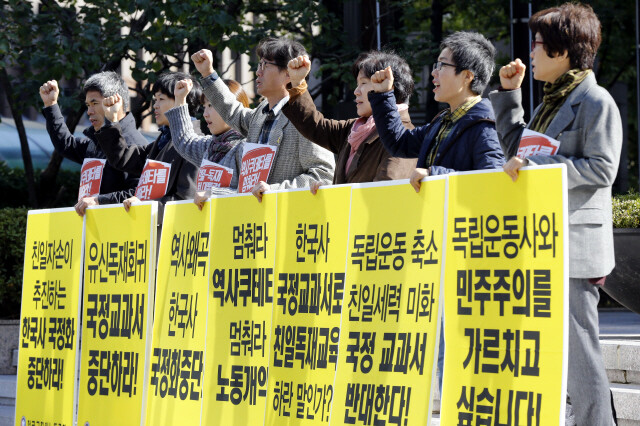hankyoreh
Links to other country sites 다른 나라 사이트 링크
High Court restores KTU’s legal union status

Seoul High Court accepted a request to suspend an administration notification revoking the legal status of the Korean Teachers’ and Education Workers’ Union (KTU), thereby overturning a previous Supreme Court decision.
The decision means KTU could face trial over the retention of its lawful union status when it receives an appeals court judgment.
Judge Kim Myeong-su of the court’s tenth administrative division ruled on Nov. 16 to accept KTU’s request to the Ministry of Employment and Labor to suspend the notification “until the time of an appeals court ruling and sentence.” The court was hearing the KTU case after a previous reversal and remand ruling.
In October 2013, the Ministry of Employment and Labor notified KTU that it was no longer a union because it had dismissed teachers as members, prompting KTU to file suit to have the administration‘s measure overturned. After a loss for KTU in the first trial, the case is currently awaiting appellate judgment at Seoul High Court’s seventh administrative division.
In June, the Supreme Court reversed and remanded the seventh administrative division‘s ruling accepting KTU’s request. In its decision, it argued that “with a Constitutional Court decision supporting the constitutionality of Article 2 of the Act on the Establishment, Operation, etc., of Trade Unions for Teachers, the court‘s ruling that there were grounds for suspending the non-legal union notification on the basis that a constitutionality ruling had been requested for the article in question was mistaken.”
But, as if particularly attentive to the Supreme Court’s conclusion that it had misunderstood the legal principles of a suspension, the High Court gave a point-by-point explanation of the reasons for its suspension decision in the new ruling.
“While Article 2 of the Trade Unions for Teachers Act, which bans teachers’ union membership for dismissed teachers, may not have been found unconstitutional by the Constitutional Court’s decision, a number of issues worthy of dispute remain,” it wrote.
The court‘s message was that decisions on the issues in question should be made through a thorough trial on the original case.
The court also argued that additional hearings were needed on whether the administration overstepped its authority with the decision.
“Given that the administration’s action did not take place until 2013, even though dismissed education workers had been consistently present in KTU before that, the matter of whether to declare KTU a non-legal union depends on the decisions of administrative authorities,” the court said. “Our decision agrees with that of the Constitutional Court.”
As a basis for its suit, the KTU had cited the “irrecoverable damage” it would suffer from losing its status as a lawful union. In its ruling, the court noted that it would be “unable to use the title of ‘union’ if declared a non-legal union, and would be unable to exercise the practical rights afforded to unions by union law, being unable to request National Labor Relations Commission arbitration on labor disputes or relief for improper labor actions.”
“The members of the union would also be expected to find themselves drawn into various legal disputes,” it predicted.
KTU spokesperson Song Jae-hyeok said the court’s decision had “essentially recognized how excessive the administration’s decision was when it denied the legal status of the entire KTU, with a membership of 60,000, over the presence of nine dismissed teachers.”
“We welcome the court‘s decision and are very pleased that the KTU has regained its lawful union status,” Song added.
The Ministry of Education said it “respects the court’s decision,” but added that it would “have to be discrete until there is a ruling in the original case.”
“We believe that matters such as resuming negotiations with the KTU can also be addressed once illegal actions have been resolved,” the ministry added, in an apparent reference to disciplinary action for participation in public statements on political issues.
By Seo Young-ji and Jeon Jung-yoon, staff reporters
Please direct questions or comments to [english@hani.co.kr]

Editorial・opinion
![[Editorial] Yoon must halt procurement of SM-3 interceptor missiles [Editorial] Yoon must halt procurement of SM-3 interceptor missiles](https://flexible.img.hani.co.kr/flexible/normal/500/300/imgdb/child/2024/0501/17145495551605_1717145495195344.jpg) [Editorial] Yoon must halt procurement of SM-3 interceptor missiles
[Editorial] Yoon must halt procurement of SM-3 interceptor missiles![[Guest essay] Maybe Korea’s rapid population decline is an opportunity, not a crisis [Guest essay] Maybe Korea’s rapid population decline is an opportunity, not a crisis](https://flexible.img.hani.co.kr/flexible/normal/500/300/imgdb/original/2024/0430/9417144634983596.jpg) [Guest essay] Maybe Korea’s rapid population decline is an opportunity, not a crisis
[Guest essay] Maybe Korea’s rapid population decline is an opportunity, not a crisis- [Column] Can Yoon steer diplomacy with Russia, China back on track?
- [Column] Season 2 of special prosecutor probe may be coming to Korea soon
- [Column] Park Geun-hye déjà vu in Yoon Suk-yeol
- [Editorial] New weight of N. Korea’s nuclear threats makes dialogue all the more urgent
- [Guest essay] The real reason Korea’s new right wants to dub Rhee a founding father
- [Column] ‘Choson’: Is it time we start referring to N. Korea in its own terms?
- [Editorial] Japan’s rewriting of history with Korea has gone too far
- [Column] The president’s questionable capacity for dialogue
Most viewed articles
- 1Months and months of overdue wages are pushing migrant workers in Korea into debt
- 2[Guest essay] Maybe Korea’s rapid population decline is an opportunity, not a crisis
- 3Dermatology, plastic surgery drove record medical tourism to Korea in 2023
- 4Under conservative chief, Korea’s TRC brands teenage wartime massacre victims as traitors
- 5[Column] Can Yoon steer diplomacy with Russia, China back on track?
- 6First meeting between Yoon, Lee in 2 years ends without compromise or agreement
- 7“Korea is so screwed!”: The statistic making foreign scholars’ heads spin
- 8[Editorial] Japan’s rewriting of history with Korea has gone too far
- 9Two factors that’ll decide if Korea’s economy keeps on its upward trend
- 10[Column] For K-pop idols, is all love forbidden love?